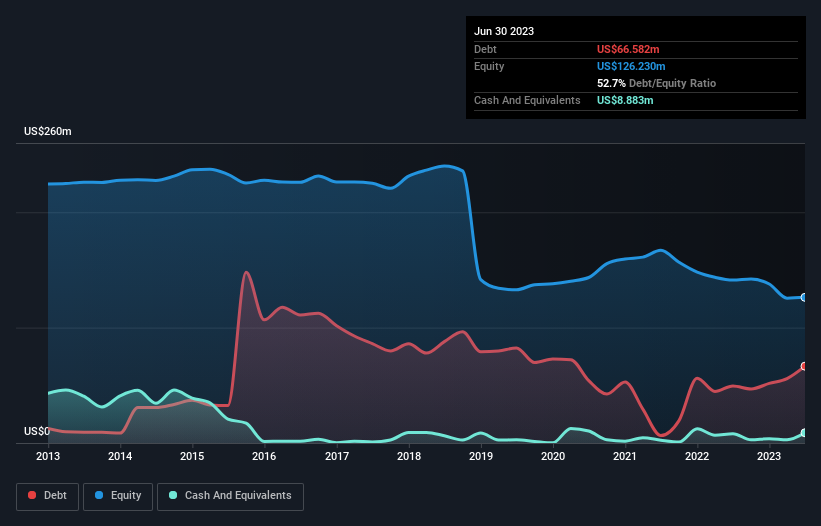
David Iben put it well when he said, 'Volatility is not a risk we care about. What we care about is avoiding the permanent loss of capital.' When we think about how risky a company is, we always like to look at its use of debt, since debt overload can lead to ruin. We note that Orion Group Holdings, Inc. (NYSE:ORN) does have debt on its balance sheet. But is this debt a concern to shareholders?
When Is Debt A Problem?
Debt assists a business until the business has trouble paying it off, either with new capital or with free cash flow. If things get really bad, the lenders can take control of the business. However, a more frequent (but still costly) occurrence is where a company must issue shares at bargain-basement prices, permanently diluting shareholders, just to shore up its balance sheet. Of course, debt can be an important tool in businesses, particularly capital heavy businesses. The first step when considering a company's debt levels is to consider its cash and debt together.
View our latest analysis for Orion Group Holdings
What Is Orion Group Holdings's Net Debt?
The image below, which you can click on for greater detail, shows that at June 2023 Orion Group Holdings had debt of US$66.6m, up from US$49.4m in one year. However, because it has a cash reserve of US$8.88m, its net debt is less, at about US$57.7m.

A Look At Orion Group Holdings' Liabilities
According to the last reported balance sheet, Orion Group Holdings had liabilities of US$165.8m due within 12 months, and liabilities of US$77.2m due beyond 12 months. On the other hand, it had cash of US$8.88m and US$207.0m worth of receivables due within a year. So its liabilities total US$27.1m more than the combination of its cash and short-term receivables.
Of course, Orion Group Holdings has a market capitalization of US$165.7m, so these liabilities are probably manageable. However, we do think it is worth keeping an eye on its balance sheet strength, as it may change over time. When analysing debt levels, the balance sheet is the obvious place to start. But it is future earnings, more than anything, that will determine Orion Group Holdings's ability to maintain a healthy balance sheet going forward. So if you want to see what the professionals think, you might find this free report on analyst profit forecasts to be interesting.
In the last year Orion Group Holdings wasn't profitable at an EBIT level, but managed to grow its revenue by 7.3%, to US$721m. That rate of growth is a bit slow for our taste, but it takes all types to make a world.
Caveat Emptor
Importantly, Orion Group Holdings had an earnings before interest and tax (EBIT) loss over the last year. Indeed, it lost a very considerable US$22m at the EBIT level. Considering that alongside the liabilities mentioned above does not give us much confidence that company should be using so much debt. So we think its balance sheet is a little strained, though not beyond repair. However, it doesn't help that it burned through US$25m of cash over the last year. So in short it's a really risky stock. There's no doubt that we learn most about debt from the balance sheet. However, not all investment risk resides within the balance sheet - far from it. Case in point: We've spotted 2 warning signs for Orion Group Holdings you should be aware of.
Of course, if you're the type of investor who prefers buying stocks without the burden of debt, then don't hesitate to discover our exclusive list of net cash growth stocks, today.
New: AI Stock Screener & Alerts
Our new AI Stock Screener scans the market every day to uncover opportunities.
• Dividend Powerhouses (3%+ Yield)
• Undervalued Small Caps with Insider Buying
• High growth Tech and AI Companies
Or build your own from over 50 metrics.
Have feedback on this article? Concerned about the content? Get in touch with us directly. Alternatively, email editorial-team (at) simplywallst.com.
This article by Simply Wall St is general in nature. We provide commentary based on historical data and analyst forecasts only using an unbiased methodology and our articles are not intended to be financial advice. It does not constitute a recommendation to buy or sell any stock, and does not take account of your objectives, or your financial situation. We aim to bring you long-term focused analysis driven by fundamental data. Note that our analysis may not factor in the latest price-sensitive company announcements or qualitative material. Simply Wall St has no position in any stocks mentioned.
About NYSE:ORN
Orion Group Holdings
Operates as a specialty construction company in the building, industrial, and infrastructure sectors in the United States, Alaska, Hawaii, Canada, and the Caribbean Basin.
Flawless balance sheet and good value.
Similar Companies
Market Insights
Community Narratives



